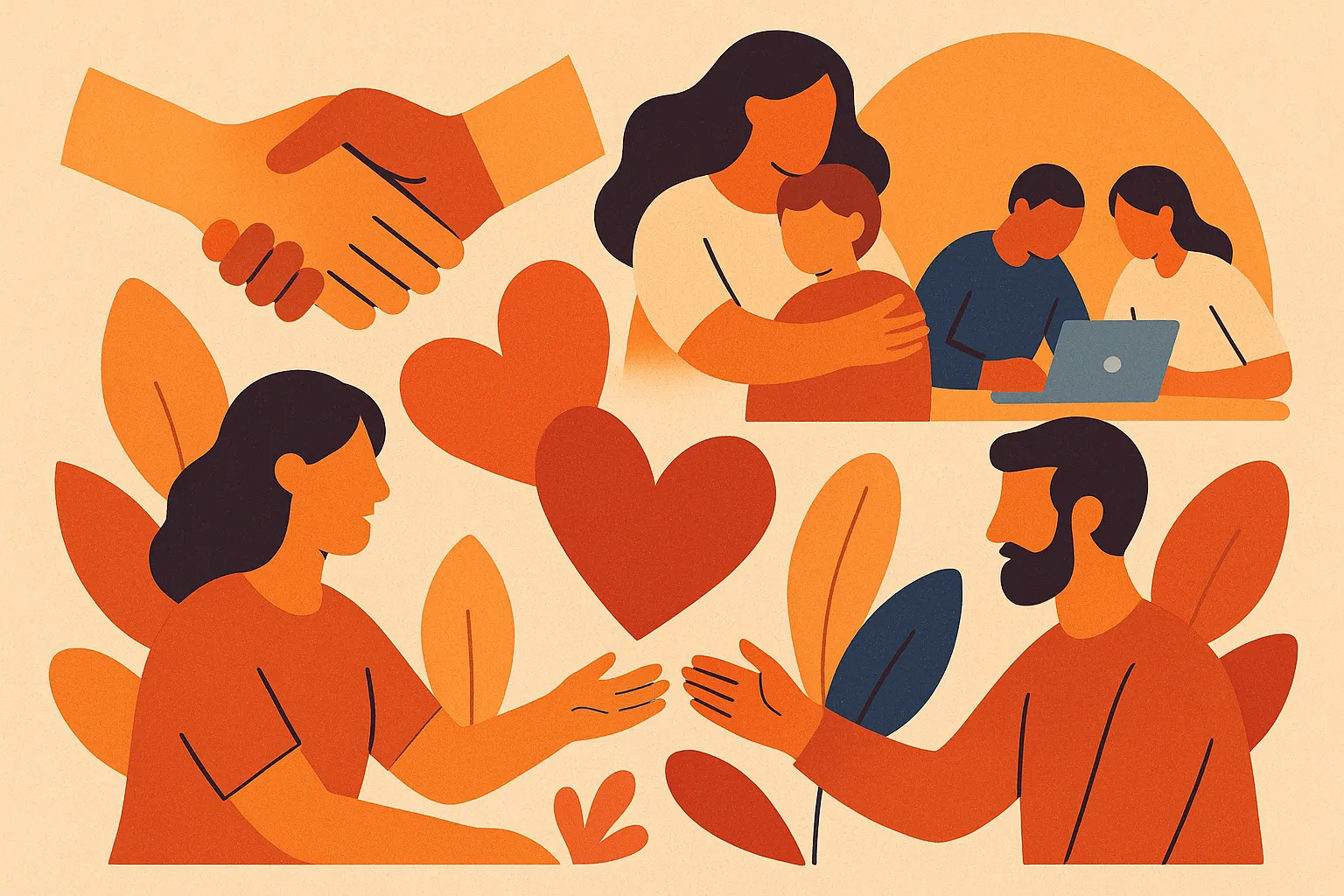In our increasingly complex world, the simple act of helping one another has never been more vital. Mutual aid is not just a charitable notion; it is a way of building resilient communities and making daily life more manageable. Within families, mutual aid can take many forms: children helping grandparents with technology, parents assisting teenagers with administrative tasks, or neighbours sharing childcare duties. Each small gesture strengthens bonds and creates a network of trust.
At work, the principles of mutual aid are just as powerful. Team members who support each other through challenges not only complete tasks more effectively but also foster an environment of respect and collaboration. Whether it is helping a colleague organise documents, sharing knowledge about a complex application, or stepping in during a busy period, these acts of solidarity contribute to a healthier and more productive workplace.
Platforms like Askaide make it easy to offer and request help in a way that respects everyone’s skills and availability. By connecting people who need assistance with those who want to help, Askaide builds bridges between generations, professions and cultures. The platform allows families to find reliable babysitters, elderly people to get help with paperwork, freelancers to offer translation services, and much more.
Mutual aid reminds us that we are all stronger together. It empowers individuals to share their talents and time, reduces the isolation of modern life, and promotes a culture of empathy. When we invest in mutual aid, we invest in our collective future.
Sharing help doesn't diminish us; it enriches our community. When we give and receive support, we create a cycle of generosity that benefits everyone and inspires others to do the same..
In today's rapidly changing environment, the synergy between home and office life is more important than ever. Mutual aid acts like a bridge, weaving the values of compassion and cooperation across every sphere. When we help an elderly neighbour with groceries or share a proven process with a colleague, we strengthen the invisible threads of trust that hold our communities together. These acts remind us that we are part of a larger whole, a network of relationships and responsibilities that extends beyond our own needs. This shared commitment fosters resilience in the face of adversity and empowers families and teams to meet challenges with confidence.
The digital revolution has expanded the possibilities for solidarity. With video calls, collaborative apps and online platforms such as Askaide, offering support no longer depends on being in the same room. A working parent can find a reliable babysitter through a couple of clicks, while a freelancer can provide administrative help to someone across town. These tools democratize access to assistance and align with modern notions of flexibility and inclusion. As remote work becomes the norm, communities that embrace technology to organize their mutual aid become more agile. They respond faster to needs, coordinate resources more effectively, and encourage active participation from younger generations, who are fluent in digital communication.
The benefits of this culture extend beyond practical help. Psychological research shows that acts of altruism boost self-esteem and reduce stress, promoting emotional well-being for both giver and receiver. In workplaces, cooperation improves knowledge transfer, sparks innovation and enhances morale. When employees feel supported, they are more engaged and loyal, increasing productivity and reducing burnout. For families, being part of a supportive network means parents can take time for themselves, children learn empathy from observing caring behaviour, and elders feel valued. This holistic approach to wellbeing is rooted in the idea that mutual support is not a transaction but an investment in social capital that yields long-term dividends.
To embed mutual aid in daily life, intentional communication is key. Families can schedule regular meetings to discuss tasks, expectations and boundaries. Teams can implement mentorship programmes and peer-to-peer learning sessions. Recognising contributions with sincere gratitude reinforces positive behaviour and fosters a sense of belonging. Askaide’s community guidelines highlight the importance of respect and transparency when seeking or offering help, ensuring that interactions remain constructive. By developing clear processes and harnessing collective intelligence, individuals are empowered to contribute according to their skills and availability. This approach promotes fairness and prevents burnout, illustrating that effective support networks are designed with care.
The horizon is bright for those who cultivate a culture of help. As society grapples with uncertainty and rapid change, the ability to lean on one another becomes a strategic advantage. Families and organisations that prioritise solidarity build resilience, adapt more easily and attract others who share their values. Moreover, nurturing a mindset of mutual care contributes to sustainable development by encouraging resource sharing and reducing duplication of efforts. Ultimately, embracing mutual aid is about more than solving immediate problems; it is about co-creating a future in which interdependence is celebrated and every individual is empowered to thrive. By making this commitment, you strengthen not only your own household and workplace but the broader fabric of society. By intentionally weaving support into our daily routines, we move forward together with confidence.
At work, the principles of mutual aid are just as powerful. Team members who support each other through challenges not only complete tasks more effectively but also foster an environment of respect and collaboration. Whether it is helping a colleague organise documents, sharing knowledge about a complex application, or stepping in during a busy period, these acts of solidarity contribute to a healthier and more productive workplace.
Platforms like Askaide make it easy to offer and request help in a way that respects everyone’s skills and availability. By connecting people who need assistance with those who want to help, Askaide builds bridges between generations, professions and cultures. The platform allows families to find reliable babysitters, elderly people to get help with paperwork, freelancers to offer translation services, and much more.
Mutual aid reminds us that we are all stronger together. It empowers individuals to share their talents and time, reduces the isolation of modern life, and promotes a culture of empathy. When we invest in mutual aid, we invest in our collective future.
Sharing help doesn't diminish us; it enriches our community. When we give and receive support, we create a cycle of generosity that benefits everyone and inspires others to do the same..
In today's rapidly changing environment, the synergy between home and office life is more important than ever. Mutual aid acts like a bridge, weaving the values of compassion and cooperation across every sphere. When we help an elderly neighbour with groceries or share a proven process with a colleague, we strengthen the invisible threads of trust that hold our communities together. These acts remind us that we are part of a larger whole, a network of relationships and responsibilities that extends beyond our own needs. This shared commitment fosters resilience in the face of adversity and empowers families and teams to meet challenges with confidence.
The digital revolution has expanded the possibilities for solidarity. With video calls, collaborative apps and online platforms such as Askaide, offering support no longer depends on being in the same room. A working parent can find a reliable babysitter through a couple of clicks, while a freelancer can provide administrative help to someone across town. These tools democratize access to assistance and align with modern notions of flexibility and inclusion. As remote work becomes the norm, communities that embrace technology to organize their mutual aid become more agile. They respond faster to needs, coordinate resources more effectively, and encourage active participation from younger generations, who are fluent in digital communication.
The benefits of this culture extend beyond practical help. Psychological research shows that acts of altruism boost self-esteem and reduce stress, promoting emotional well-being for both giver and receiver. In workplaces, cooperation improves knowledge transfer, sparks innovation and enhances morale. When employees feel supported, they are more engaged and loyal, increasing productivity and reducing burnout. For families, being part of a supportive network means parents can take time for themselves, children learn empathy from observing caring behaviour, and elders feel valued. This holistic approach to wellbeing is rooted in the idea that mutual support is not a transaction but an investment in social capital that yields long-term dividends.
To embed mutual aid in daily life, intentional communication is key. Families can schedule regular meetings to discuss tasks, expectations and boundaries. Teams can implement mentorship programmes and peer-to-peer learning sessions. Recognising contributions with sincere gratitude reinforces positive behaviour and fosters a sense of belonging. Askaide’s community guidelines highlight the importance of respect and transparency when seeking or offering help, ensuring that interactions remain constructive. By developing clear processes and harnessing collective intelligence, individuals are empowered to contribute according to their skills and availability. This approach promotes fairness and prevents burnout, illustrating that effective support networks are designed with care.
The horizon is bright for those who cultivate a culture of help. As society grapples with uncertainty and rapid change, the ability to lean on one another becomes a strategic advantage. Families and organisations that prioritise solidarity build resilience, adapt more easily and attract others who share their values. Moreover, nurturing a mindset of mutual care contributes to sustainable development by encouraging resource sharing and reducing duplication of efforts. Ultimately, embracing mutual aid is about more than solving immediate problems; it is about co-creating a future in which interdependence is celebrated and every individual is empowered to thrive. By making this commitment, you strengthen not only your own household and workplace but the broader fabric of society. By intentionally weaving support into our daily routines, we move forward together with confidence.






